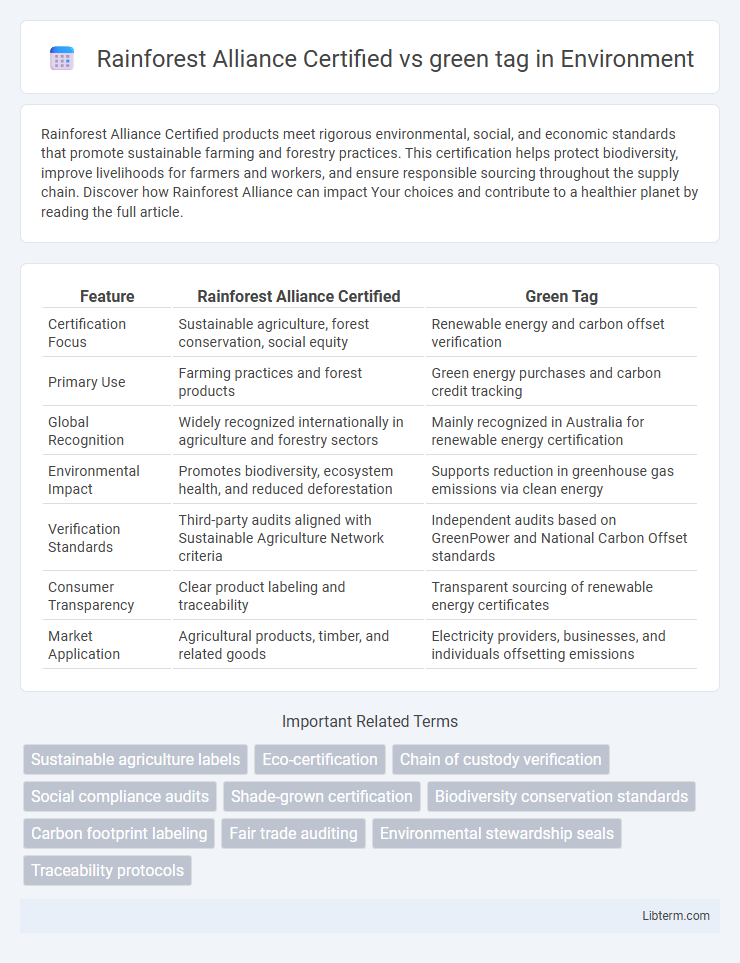Rainforest Alliance Certified products meet rigorous environmental, social, and economic standards that promote sustainable farming and forestry practices. This certification helps protect biodiversity, improve livelihoods for farmers and workers, and ensure responsible sourcing throughout the supply chain. Discover how Rainforest Alliance can impact Your choices and contribute to a healthier planet by reading the full article.
Table of Comparison
| Feature | Rainforest Alliance Certified | Green Tag |
|---|---|---|
| Certification Focus | Sustainable agriculture, forest conservation, social equity | Renewable energy and carbon offset verification |
| Primary Use | Farming practices and forest products | Green energy purchases and carbon credit tracking |
| Global Recognition | Widely recognized internationally in agriculture and forestry sectors | Mainly recognized in Australia for renewable energy certification |
| Environmental Impact | Promotes biodiversity, ecosystem health, and reduced deforestation | Supports reduction in greenhouse gas emissions via clean energy |
| Verification Standards | Third-party audits aligned with Sustainable Agriculture Network criteria | Independent audits based on GreenPower and National Carbon Offset standards |
| Consumer Transparency | Clear product labeling and traceability | Transparent sourcing of renewable energy certificates |
| Market Application | Agricultural products, timber, and related goods | Electricity providers, businesses, and individuals offsetting emissions |
Introduction to Rainforest Alliance Certified and Green Tag
Rainforest Alliance Certified products meet rigorous environmental, social, and economic standards that promote sustainable agriculture and forest management, ensuring biodiversity conservation and better livelihoods for farmers. Green Tag certification is an independent eco-label that verifies products based on their life-cycle assessments, emphasizing measured environmental impacts such as carbon footprint and water usage. Both certifications provide consumers with reliable indicators of sustainability, but Rainforest Alliance focuses more on broader ecosystem and community benefits, whereas Green Tag emphasizes quantifiable environmental performance metrics.
Overview of Sustainability Certifications
Rainforest Alliance Certified focuses on comprehensive sustainability standards that promote biodiversity conservation, improved livelihoods, and responsible land use across agriculture, forestry, and tourism sectors. The Green Tag certification emphasizes renewable energy and carbon offset projects, ensuring verified reductions in greenhouse gas emissions through projects like wind, solar, and methane capture. Both certifications play crucial roles in encouraging environmental responsibility, with Rainforest Alliance targeting broader ecosystem and social benefits, while Green Tag specifically addresses energy sustainability and carbon footprint reduction.
What is Rainforest Alliance Certified?
Rainforest Alliance Certified is a sustainability certification awarded to farms, forests, and businesses that meet rigorous environmental, social, and economic criteria. This certification ensures protection of biodiversity, improved livelihoods for workers and local communities, and adherence to responsible land management practices. It is recognized globally as a mark of commitment to sustainable agriculture and conservation efforts.
What is Green Tag Certification?
Green Tag Certification is an independent eco-label that verifies sustainable practices in energy, products, and services, promoting environmental responsibility and carbon reduction. It assesses environmental impact using rigorous standards to ensure certified entities contribute to lowering carbon footprints. Unlike Rainforest Alliance Certified, which primarily focuses on sustainable agriculture and forestry, Green Tag Certification encompasses a broader range of sustainable sectors including renewable energy and carbon offset projects.
Certification Standards and Criteria Comparison
Rainforest Alliance Certified focuses on sustainable agriculture, forestry, and tourism by enforcing rigorous environmental, social, and economic standards designed to protect biodiversity and improve livelihoods. The Green Tag certification primarily targets renewable energy projects, emphasizing verified emission reductions and verified environmental benefits under a strict carbon accounting framework. Both certifications maintain transparency and third-party auditing but differ significantly in their sector-specific criteria and sustainability impact metrics.
Environmental Impact: Rainforest Alliance vs Green Tag
Rainforest Alliance Certified products ensure sustainable agriculture practices that protect biodiversity, conserve natural resources, and improve the livelihoods of farmers through rigorous environmental standards. Green Tag certification emphasizes environmental impact by assessing carbon footprint, resource efficiency, and waste reduction across a product's lifecycle, promoting transparency and eco-friendly manufacturing processes. Both certifications contribute to environmental sustainability but Rainforest Alliance focuses on biodiversity and ecosystem health, while Green Tag specializes in carbon impact and resource optimization.
Social Responsibility and Community Benefits
Rainforest Alliance Certified products ensure strict adherence to social responsibility standards, promoting fair labor practices, improved working conditions, and community empowerment in agricultural regions. The certification actively supports local livelihoods by fostering access to education, healthcare, and sustainable economic opportunities for farmers and their families. In contrast, the Green Tag certification emphasizes environmental sustainability with less comprehensive frameworks addressing social equity and community benefits.
Market Recognition and Consumer Trust
Rainforest Alliance Certified products benefit from strong global market recognition due to their rigorous sustainability standards verified by third-party audits, enhancing consumer trust in environmentally and socially responsible sourcing. Green tag certifications vary widely but often lack the universal credibility and consistent oversight associated with Rainforest Alliance, leading to variable degrees of market acceptance and consumer confidence. Businesses leveraging Rainforest Alliance certification typically experience higher consumer loyalty and competitive advantage in eco-conscious markets.
Costs and Accessibility of Certification
Rainforest Alliance Certified programs often involve higher upfront costs due to extensive auditing and compliance requirements, making certification less accessible for small-scale producers or businesses with limited budgets. In contrast, Green Tag certification typically offers a more affordable and streamlined process, lowering financial barriers and expanding accessibility to a broader range of suppliers and retailers. Both certifications vary in regional availability, but Green Tag's lower cost structure generally enhances accessibility in emerging markets compared to the Rainforest Alliance's more rigorous and costly framework.
Choosing the Right Certification: Key Considerations
Choosing the right certification involves evaluating the specific environmental and social standards each label enforces; Rainforest Alliance Certified emphasizes biodiversity conservation, sustainable livelihoods, and improved farm management practices. In contrast, Green Tag certification focuses primarily on renewable energy and carbon offset projects, ensuring verifiable reductions in greenhouse gas emissions. Businesses should consider their sustainability goals, stakeholder expectations, and market demands when selecting between these certifications to maximize environmental impact and credibility.
Rainforest Alliance Certified Infographic

 libterm.com
libterm.com